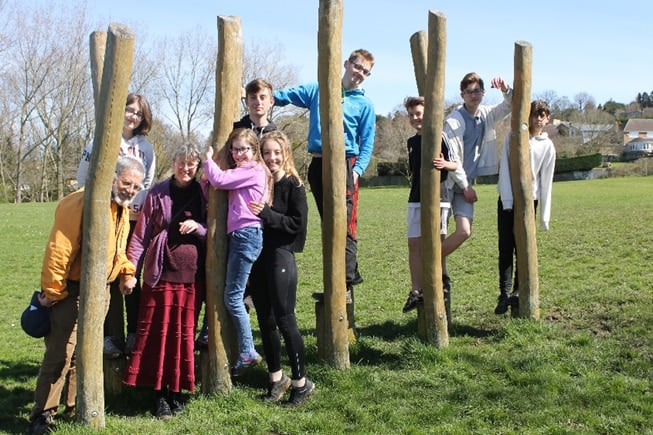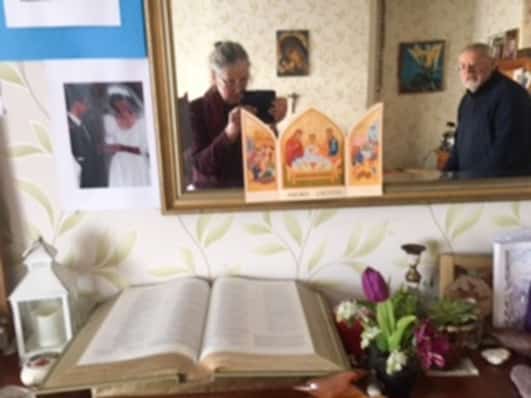
The vocation of the parent
If marriage is a gift, a sacrament and a vocation, then being a parent flows from the whole of that reality; and, indeed, it helps to manifest, to show, that the whole is a work of God to which we are called and from whom we have seek help.
It is true, too, some people are unable to have children and there are many aspects to the question of how this cross, uninvited, and often painfully lived, can bloom in the desert of dying hopes for a family – but with God nothing is impossible (cf. Lk 1: 37); and, as such, this takes prayer and advice, just as being open to life takes prayer and advice too.
My wife and I, although marrying late, I was forty and she was thirty-six, had ten children in more or less ten years although two, we hope, went straight to heaven in that they were very early miscarriages. Nevertheless, these two are often in our thoughts and are talked about too.
So not only is there going to be a whole variety of personal characteristics and circumstances that make up each marital reality, but there are going to be varied situations, too, which impact on the family; and which, therefore, impact on the vocation of parent-as-teacher.
Adapting a piece of advice about prayer, then, that it is better to pray as you can than struggle and often fail to pray in a way that you cannot accomplish; and, given our individuality and training, we need to see how we can take up the gift and the task of teaching, however imperfectly, according to what we can manage to do.
There may be, according to a particular charism or gift of the Holy Spirit to the Church, that we may be formed in, guidance in how to teach our children and indeed pass the faith to them; but, in general, prayer, preparation and drawing on the liturgical life of the Church, are foundational ingredients.
A time to pray
Dialogue has to have time, as it were, whether it is a conversation about the day, interests, what is going on in the world; and, hopefully, out of a general atmosphere, although tense at times, it is possible to discuss religious questions.
One particular time to talk about faith is just before sleep; it was a time recommended by St. Don Bosco, the founder of the Salesian priests, who cared for youth who migrated to the cities. He is right; it is often a time the children, particularly the boys, will talk.
So, prayer, if anything, grows; it begins with husband and wife and, while it has specific times with the children, like bedtime, mealtimes, Sunday morning, times of crisis, such as when we learn of a friend of one of our children is thinking of suicide and we pray a decade of the rosary and take her to hospital, it can as we see spring up anywhere at any time.
A particular moment, struck into my consciousness, is when I was shopping in a supermarket with three of our young children and one of them, who I was having trouble to get to hold on to the trolley, skipped in front of a flower stand and was out of sight for a moment and then, as I rounded the corner, she was gone.

I could have gone anywhere looking for her and, instead, I stopped and prayed and looked towards the checkout and there she was, hand in hand with someone else; I called, not loudly at first and then a second time, more loudly, and she came back.
While I reported this incident to the police, I was never more thankful that I stopped to pray instead of panicking; and, inevitably, I have often wondered what “would” have happened had I not seen her going out of the supermarket with, whoever it was, for whom I have often prayed.
A place to pray
Our dining room, particularly for Sunday Morning Prayer, is the place to pray. There are different pictures around the room, particularly an Icon of Mary, a painting by my late father of St. Michael slaying the dragon, a three-panel card announcing the joy of love in marriage and family life, a tatty glass cabinet on which sits a bible, except we change it for the crib at Christmas, flowers and, in view of our twenty-fifth wedding anniversary, there are reminders of our wedding and indeed a certificate from the late St. John Paul II commemorating the celebration of our marriage.
Being reminded of my bride on our wedding day is very helpful as I see how great is the toll of bearing our children and that, as it says in Sirach: ‘Forsake not an old friend, for a new one does not compare with … [her]’ (9: 10); and, as it says in the book of Tobit, be appreciative of your mother and, adapting it, let the husband be appreciative of his wife’s bearing his children (cf. Tobit, 4: 3-4). So Lent comes with a reminder to deepen love and not to lament the loss of appearance.
The bible has a prime place, as the word of God to which we listen when, as the domestic Church, we gather to pray; it is open on a random page and, from time to time, it is simply changed.
I know it gets read because, the other day, my wife was telling me what it said about old age and death – either it is welcome or it comes to break us out of our comfortable lives (Sirach 40). In other words, while there are all sorts of bits and pieces about, I try not to let the room become too cluttered so that there is a clarity about remembering God; nevertheless, generally, when it comes to Morning Prayer, there is a need to tidy up all that has crept over the back of chairs, the various heaps, shoes, books and mess.
We once tried the family rosary but it produced too much resentment and so we say, before and after meals, a short thanksgiving prayer and a single Hail Mary; and, in the present climate of conflict, we have taken up the practice of three Hail Mary’s at the end of the meal.

Teaching and teaching the Faith
Out, then, of the general milieu of the family, which entails books, toys, games, art and craft materials, encouraging whatever talents we see emerging and modifying, where possible, the addictive phone games and time at the gym or on the playing field, there emerges the habits of family life, the questions about what we do, why and the times in which we live and its impact on us all, whether from school, the Church at large or society.
On the one hand, there is the daily life and routine of meals and a brief prayer before and after and, indeed, these practices grow, as one or another may have been neglected, forgotten or not really practiced and, as already mentioned, very concrete examples of prayers being answered, slowly or quickly, are a real help.
But so, too, are the other answers that attempt to find a way through the resistance that arises when a prayer does not seem to be answered and, therefore, it is necessary to explore the question of whether what we are asking for is good for us, generally, at this time, or would what we want impact on others, like good weather for football and, more widely, considering the nature of God as capable of being “on call 24/7”.
On the other hand, there are the challenges that arise from a joint Catholic and Anglican school, friendships or ideas abroad. In particular, if a school does not teach the full truth of the Catholic Faith, particularly concerning being open to life and calls it “Catholic contraception”, then there needs to be an explanation that natural family planning can not be used, while being unwilling to welcome a so called unplanned child, because it is being used “contraceptively” – to reject the possibility of children.
Even, then, in a Catholic school, a program advocating a two child family as “ideal” and emphasising the astronomical cost of each child and the child coming home distressed and confused about the ecological size of the family – needs the remedy that hoping in God, prayer and providence have a “natural” part to play in Catholic family life.
All in all, then, the vocation of the parent as the first teacher of the Catholic Faith grows with the reality of the family and the unfolding of the grace and talents that God gives to fulfil the mission He entrusts us.
Mr. Francis Etheredge is a Catholic layman, married with eight children, plus three in heaven and a writer. More about marriage and prayer in From Truth and truth: Volume III: Faith is Married Reason (all published by Cambridge Scholars Publishing), pilgrimage and family prayer in The Family on Pilgrimage: God Leads Through Dead Ends and Within Reach of You: A Book of Prose and Prayers (both published by En Route Books and Media).
He has earned a BA Div (Hons), MA in Catholic Theology, PGC in Biblical Studies, PGC in Higher Education, and an MA in Marriage and Family (Distinction).
